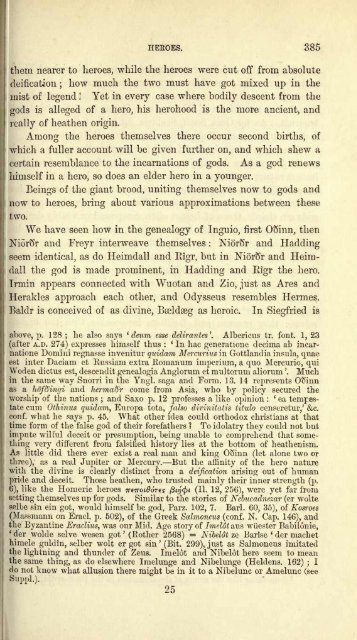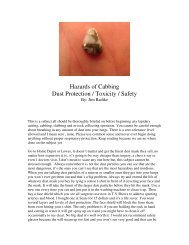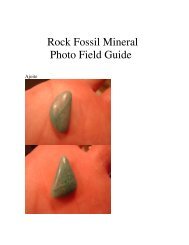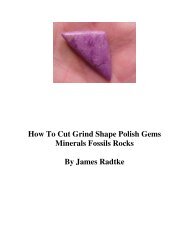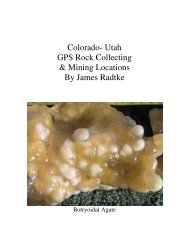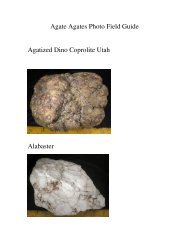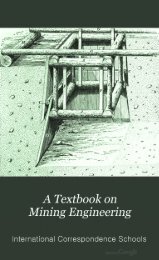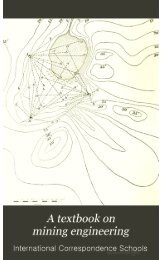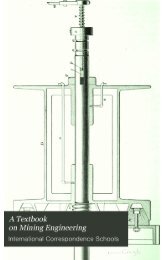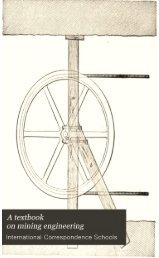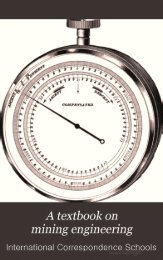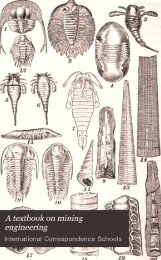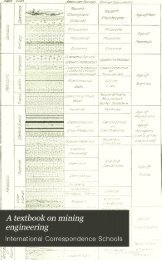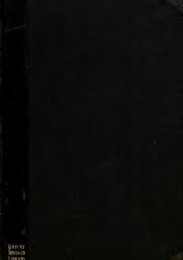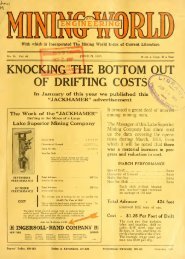- Page 6 and 7:
{
- Page 9 and 10:
" " TKANSLATOK S PKEFACE.
- Page 11 and 12:
see Translator s Preface. vii the p
- Page 13 and 14:
TO Professor MAX MULLER, M.A., &c.,
- Page 15:
~" CONTENTS. CHAPTER VOL. I. *
- Page 18 and 19:
2 INTRODUCTION. The worn out empire
- Page 20 and 21:
4 INTRODUCTION. had heathen inhabit
- Page 22 and 23:
INTRODUCTION. lament, though the se
- Page 24 and 25:
8 INTRODUCTION. had formerly proved
- Page 26 and 27:
10 INTRODUCTION. coming to the resc
- Page 28 and 29:
12 INTRODUCTION. the new faith, wou
- Page 30 and 31:
14 GOD. good, Goth, gods, O.N, go o
- Page 32 and 33:
16 GOD. gote suit ir willekomen sin
- Page 34 and 35:
18 GOD. sentiment, that imputes to
- Page 36 and 37:
ofc 20 GOD. The Vandal Gizerich ste
- Page 38 and 39:
22 GOD. Among substantive epithets
- Page 40 and 41:
24 GOD. 136. 183 (v<f&gt
- Page 42 and 43:
26 GOD. we observe that the Etrusca
- Page 44 and 45:
28 GOD. and ragin, all lead both in
- Page 46 and 47:
30 WORSHIP. think, vita. From it is
- Page 48 and 49:
32 WORSHIP. God, but to all whom on
- Page 50 and 51:
34 WOKSHIP. verb dug a with the sen
- Page 52 and 53:
36 WORSHIP. Lu. 2, 37; he construes
- Page 54 and 55:
38 WORSHIP. from this OHG. ineihhan
- Page 56 and 57:
l>e made 40 WORSHIP. renders
- Page 58 and 59:
42 WORSHIP. game killed, the enemy
- Page 60 and 61:
44 WORSHIP. disease was rife ; some
- Page 62 and 63:
46 WORSHIP. taken, was supposed to
- Page 64 and 65:
48 WORSHIP. of the mysterious meani
- Page 66 and 67:
50 WORSHIP. The Hack ox and Hack co
- Page 68 and 69:
. If 52 WORSHIP. became one destine
- Page 70 and 71:
54 AVOESHIP. musicians) knows somet
- Page 72 and 73:
56 WORSHIP. aurov? ?yyoz> eV
- Page 74 and 75:
58 WORSHIP. ribbons. To this day, a
- Page 76 and 77:
60 WORSHIP. saga (ed. holm.) 113. s
- Page 78 and 79:
mir 62 WORSHIP. plenty of them : de
- Page 80 and 81:
64 WORSHIP. Beside prayers and sacr
- Page 82 and 83:
CHAPTEE IV. TEMPLES. In our inquiri
- Page 84 and 85:
68 TEMPLES. Ve, denotes one particu
- Page 86 and 87:
70 TEMPLES. perfection, did it not
- Page 88 and 89:
1 TEMPLES. stand in the forest, hea
- Page 90 and 91:
74 TEMPLES. circular dance) round a
- Page 92 and 93:
76 TEMPLES. Still more unmistakably
- Page 94 and 95:
78 TEMPLES. urbe media, amcenitate
- Page 96 and 97:
80 TEMPLES. attulit: profana simul
- Page 98 and 99:
82 TEMPLES. Auciam, ubi erant templ
- Page 100 and 101:
84 TEMPLES, quoque errore seducti,
- Page 102 and 103:
86 TEMPLES. 195*) 1 ; to which were
- Page 104 and 105:
CHAPTEE V. PEIESTS. The most genera
- Page 106 and 107:
90 PRIESTS. episcopus), 0. I. 4, 4.
- Page 108 and 109:
92 PEIESTS. life, would seem to hav
- Page 110 and 111:
94 PRIESTS. relates of Harald after
- Page 112 and 113:
96 PRIESTS. cited by Dio Cassius, 6
- Page 114 and 115:
98 PRIESTS. stands here for volvu,
- Page 116 and 117:
100 GODS. Then the only question th
- Page 118 and 119:
102 GODS. common people, but withdr
- Page 120 and 121:
10-4 GODS. doubt on other gods, muc
- Page 122 and 123:
10G GODS. terms whose meaning varie
- Page 124 and 125:
108 GODS. deunt ; deus vero vester
- Page 126 and 127:
110 GODS. lacum potamicum, ibique a
- Page 128 and 129:
112 GODS. On the other hand, the Vi
- Page 130 and 131:
114 GODS. probably Thor sat in the
- Page 132 and 133:
116 GODS. statua and imago. It was
- Page 134 and 135:
118 GODS. (see Suppl.). Here was a
- Page 136 and 137:
120 GODS. his (Germ. 9), the terra
- Page 138 and 139:
122 GODS. Saxo Grammaticus, though
- Page 140 and 141:
124 GODS. already in 0. v. 4, 9, pr
- Page 142 and 143:
126 GODS. (conf. Frud) the final n
- Page 144 and 145:
128 GODS. amongst us must be placed
- Page 146 and 147:
130 GODS. do not count, while the E
- Page 148 and 149:
132 WODAN. one meaning of mens or s
- Page 150 and 151:
134 WODAN. should mean Saxones ? He
- Page 152 and 153:
136 WODAN. When Loki wanted to hide
- Page 154 and 155:
138 WODAN. The sum total of well-be
- Page 156 and 157:
140 WODAN. mir hat der Wunsch gevlu
- Page 158 and 159:
142 WODAN. sie hat des Wunsches pew
- Page 160 and 161:
144 WODAN. from Troj. 3154. 7569. 1
- Page 162 and 163:
146 WODAN. myths, I have found but
- Page 164 and 165:
148 WODAN. dove descending upon Chr
- Page 166 and 167:
150 WODAN. interpret the words : na
- Page 168 and 169:
152 WODAN. older doc. of 937 is sai
- Page 170 and 171:
154 WODAX. Dommel in N. Brabant ; a
- Page 172 and 173:
156 WODAN. Wode, Wode, lial dinen r
- Page 174 and 175:
158 WODAN. name, does occur, but no
- Page 176 and 177:
160 WODAN. space between the thumb
- Page 178 and 179:
1C2 WODAN. jolaveizlu fra Haraldi,
- Page 180 and 181:
<>l his WODAN. cular,
- Page 182 and 183:
CHAPTEE VIII. DONAE, THUNAE, (THOEE
- Page 184 and 185:
168 THUNAR. there scolding ; in Bav
- Page 186 and 187:
170 THUNAR. perhaps with reference
- Page 188 and 189:
172 THUNAR. elvai, KOI Ouovcnv avrw
- Page 190 and 191:
174 TIIUNAR. OHG. poem of Muspilli
- Page 192 and 193:
176 THUNAR. 17th century : Dear Thu
- Page 194 and 195:
178 THUNAR. : phenomenon and the st
- Page 196 and 197:
180 THUNAR. bant, . . . prisca viro
- Page 198 and 199:
182 THUNAR. current among the peopl
- Page 200 and 201:
184 THUNAR. hederich (ground-ivy? h
- Page 202 and 203:
186 THUNAR. formerly Donerswe, 1 Do
- Page 204 and 205:
188 THUNAR. far inn i austervcg at
- Page 206 and 207:
190 THUNAR. mactans/ and the sacra
- Page 208 and 209:
192 THUNAIl. the peculiar veneratio
- Page 210 and 211:
194 zio. must assume a nom. Ju, Jus
- Page 212 and 213:
196 zio. much in the same way as th
- Page 214 and 215:
198 zio. phatically their VigaguS (
- Page 216 and 217:
200 zio. and AS. alphabets, dag sto
- Page 218 and 219:
202 zio. the genitive ending -s whi
- Page 220 and 221:
iBtf 204 zio. as the son of Woden,
- Page 222 and 223:
206 zio. to the legend of Picus, a
- Page 224 and 225:
208 zio. and Pavor ; it is the two
- Page 226 and 227:
1210 FRO. word for a divine or eart
- Page 228 and 229:
212 FRO. 211 a . I shall come back
- Page 230 and 231:
214 FRO. leer (Theoderic, Derrick w
- Page 232 and 233:
216 FRO. trusty blade. Sn. 73. Ther
- Page 234 and 235:
218 FRO. midland he longs to be awa
- Page 236 and 237:
CHAPTER XL rALTAR (BALDER). The myt
- Page 238 and 239:
222 PALTAR. Alptac, Ingatac, Kertac
- Page 240 and 241:
224 PALTAR. have Hcrmo&r interweavi
- Page 242 and 243:
226 PALTAR. Pfalspiunt, 5, 399 anno
- Page 244 and 245:
<&c. Such 228 PALTAR. to the
- Page 246 and 247:
230 PALTAR. loci illius religionem,
- Page 248 and 249:
232 PALTAR. genealogies would perha
- Page 250 and 251:
234 OTHER GODS. Hesse (Kuchenb. ana
- Page 252 and 253:
236 OTHER GODS, it : brcgo engla, C
- Page 254 and 255:
238 OTHER GODS. einum, means to ins
- Page 256 and 257:
240 OTHER GODS. the nom., Cacdm. 20
- Page 258 and 259:
242 OTHER GODS. proceed breath and
- Page 260 and 261:
244 OTHER GODS. never once names th
- Page 262 and 263:
246 OTHER GODS. The formula, unz Lo
- Page 264 and 265:
248 OTHER GODS. dagr, Swed. logerda
- Page 266 and 267:
CHAPTEE XIII. GODDESSES. In treatin
- Page 268 and 269:
252 GODDESSES. terror sanctaque ign
- Page 270 and 271:
254 GODDESSES. them a good scratchi
- Page 272 and 273:
256 GODDESSES. in the black lake,1
- Page 274 and 275:
i { 258 GODDESSES. sacro, parum com
- Page 276 and 277:
260 GODDESSES. tatem ? Cogebant sen
- Page 278 and 279:
262 GODDESSES. nos multorum multitu
- Page 280 and 281:
I 264 GODDESSES. originally no doub
- Page 282 and 283:
266 GODDESSES. whom the Romans iden
- Page 284 and 285:
268 GODDESSES. She stirs 1 bed, and
- Page 286 and 287:
270 GODDESSES. enters the land at C
- Page 288 and 289:
272 GODDESSES. called huldrefolk. 1
- Page 290 and 291:
274 GODDESSES. And the same threat
- Page 292 and 293:
276 GODDESSES. been to work ; it wa
- Page 294 and 295:
278 GODDESSES. und man ze tische br
- Page 296 and 297:
280 GODDESSES. for peraht, berht or
- Page 298 and 299:
282 GODDESSES. cannot point out a d
- Page 300 and 301:
284 GODDESSES. de quibus) ait Gen.
- Page 302 and 303:
286 GODDESSES. stand for one anothe
- Page 304 and 305:
288 GODDESSES. que les diversitds v
- Page 306 and 307:
290 GODDESSES. (Weisth. 1, 175) has
- Page 308 and 309:
292 GODDESSES. The. Cod. Monach. La
- Page 310 and 311:
294 GODDESSES. says quam nos histor
- Page 312 and 313:
" 296 GODDESSES. bunt, sed Var
- Page 314 and 315:
293 GODDESSES. fact and fiction ; t
- Page 316 and 317:
300 GODDESSES. harp on the connexio
- Page 318 and 319:
302 GODDESSES. such words as : Goth
- Page 320 and 321:
30 i GODDESSES. marriages, and her
- Page 322 and 323:
30G GODDESSES. Reinh. clxxii, which
- Page 324 and 325:
308 GODDESSES. atti ser eina skemmu
- Page 326 and 327:
310 GODDESSES. frumen ti (Hanka s g
- Page 328 and 329:
312 GODDESSES. carried them off, wh
- Page 330 and 331:
3 14 GODDESSES. HelreiS Brynhildar
- Page 332 and 333:
CHAPTER XIV. CONDITION OF GODS. Now
- Page 334 and 335:
318 CONDITION OF GODS. adjectives a
- Page 336 and 337:
320 CONDITION OF GODS. but, for all
- Page 338 and 339:
322 CONDITION OF GODS. on a few her
- Page 340 and 341:
324 CONDITION OF GODS. heads ; and
- Page 342 and 343:
326 CONDITION OF GODS. that betoken
- Page 344 and 345:
328 CONDITION OF GODS. car of Here,
- Page 346 and 347:
330 CONDITION OF GODS. On the other
- Page 348 and 349:
332 CONDITION OF GODS. uOdvaroi Se
- Page 350 and 351: 334 CONDITION OF GODS. gods, 1 and
- Page 352 and 353: 336 CONDITION OF GODS. deified sain
- Page 354 and 355: 338 CONDITION OF GODS. hole lie lia
- Page 356 and 357: CHAPTER XV. HEROES. Between God and
- Page 358 and 359: 342 HEROES. German rather than the
- Page 360 and 361: 344 HEROES. were Poseidon s childre
- Page 362 and 363: 340 HEROES. is a distinctive mark o
- Page 364 and 365: 348 HEROES, robore debellato, Sueti
- Page 366 and 367: 350 HEROES. Nennius, in a tradition
- Page 368 and 369: 352 HEROES. find written geormenwyr
- Page 370 and 371: 354 HEROES. in it the name of the w
- Page 372 and 373: sky, says : Lo there, quod he, cast
- Page 374 and 375: 358 HEROES. Widukind of Corvci is t
- Page 376 and 377: 360 HEROES. one another. Now, eithe
- Page 378 and 379: 3G2 HEROES. extended in four direct
- Page 380 and 381: 364 HEROES. 3. Speaking of sacrific
- Page 382 and 383: 366 HEROES. not without meaning. As
- Page 384 and 385: 3G8 HEROES. which the Danish king F
- Page 386 and 387: 370 HEROES. from the circumstance,
- Page 388 and 389: 372 HEROES. whom Apollo overcame, a
- Page 390 and 391: 374: HEROES. Wernum/ he belongs the
- Page 392 and 393: 376 HEROES. be either ora, earo (au
- Page 394 and 395: 378 HEROES. ossa Fabricii f wisan ]
- Page 396 and 397: 380 HEHOES. on them. Swedish folk-s
- Page 398 and 399: 382 HEROES. shortly before the firs
- Page 402 and 403: 386 HEROES. an echo of Baldr and Fr
- Page 404 and 405: 388 HEROES. so is Hagano one-eyed,
- Page 406 and 407: 390 HEROES. combing and not combing
- Page 408 and 409: (231 b ) : hnipnaCi Grani )m, drap
- Page 410 and 411: 394 HEROES. and a primeval, firmly
- Page 412 and 413: CIIAFTEB XVI. WISE WOMEN. The relat
- Page 414 and 415: 393 WISE WOMEN. remarkable formula
- Page 416 and 417: J>a nefna 400 V/ISE WOMEN. I
- Page 418 and 419: ; j 402 WISE WOMEN. But we obtain m
- Page 420 and 421: 404 WISE WOMEN. there met him in th
- Page 422 and 423: j j j 406 WISE WOMEN. and AS. poetr
- Page 424 and 425: 408 WISE WOMEN. qvi&r, Saem. 273 b
- Page 426 and 427: 1 From legan (to lay down, constitu
- Page 428 and 429: 412 WISE WOMEN. Brezeliande, by the
- Page 430 and 431: 414 WISE WOMEN. (creating) impart a
- Page 432 and 433: 416 WISE WOMEN. futuris liberorum e
- Page 434 and 435: 418 WISE WOMEN. of victory, p. 133,
- Page 436 and 437: 420 WISE WOMEN. When he notwithstan
- Page 438 and 439: 422 WISE WOMEN. a like phenomenon.
- Page 440 and 441: 424 WISE WOMEN. 107 a b ). Before t
- Page 442 and 443: 42 G WISE WOMEN. The award of battl
- Page 444 and 445: 428 WISE WOMEN. who laid their wing
- Page 446 and 447: < 430 WISE WOMEN. to assume
- Page 448 and 449: 432 WISE WOMEN. This seems no moder
- Page 450 and 451:
434 WISE WOMEN. | I there appears a
- Page 452 and 453:
436 WISE WOMEN. Ares ; in 4, 440 an
- Page 457 and 458:
CLASSIFIED CATALOGUE OF EDUCATIONAL
- Page 459 and 460:
" A " One GREEK AND LATIN
- Page 461 and 462:
Educational Catalogue. EURIPIDES. E
- Page 463 and 464:
Educational Catalogue. PLAUTUS. Aul
- Page 465 and 466:
Educational Catalogue. XENOPHON. Cy
- Page 467 and 468:
Educational Catalogue. 1 1 ARISTOTL
- Page 469 and 470:
Educational Catalogue. 13 LUCAN. Th
- Page 471 and 472:
Educational Catalogue. 15 THUCYDIDE
- Page 473 and 474:
Educational Catalogue. 1 7 NETTLESH
- Page 475 and 476:
" Ediicational Catalogue. MATH
- Page 477 and 478:
Educational Catalogue. 2 1 GEOMETRY
- Page 479 and 480:
" Educational Catalogue. 2 3 B
- Page 481 and 482:
Educational Catalogue. BELL S ENGLI
- Page 483 and 484:
Ediicational Catalogue. 27 MASON (C
- Page 485 and 486:
" Educational Catalogue. 29 FR
- Page 487 and 488:
; idiomatic Educational Catalogue.
- Page 489 and 490:
Educational Catalogue. 33 EBERS (G.
- Page 491 and 492:
" " The Educational Catal
- Page 493 and 494:
Educational Catalogue. 37 TECHNOLOG
- Page 495 and 496:
Educational Catalogue. 39 FLAXMAN S
- Page 497 and 498:
Educational Catalogue. 41 HISTORY.
- Page 499 and 500:
Educational Catalogue. 43 AUGUSTINE
- Page 501 and 502:
Educational Catalogue. 45 SUMMARY O
- Page 503 and 504:
Educational Catalogue. 47 BELL S CL
- Page 507:
PLEASE DO NOT REMOVE CARDS OR SLIPS


